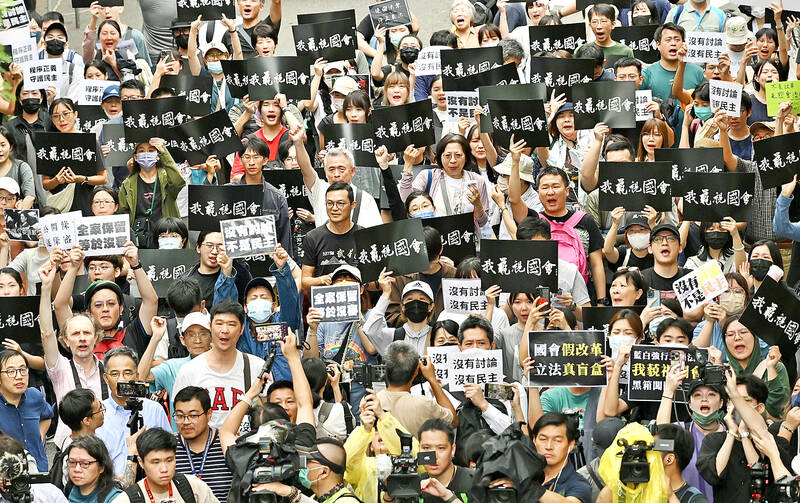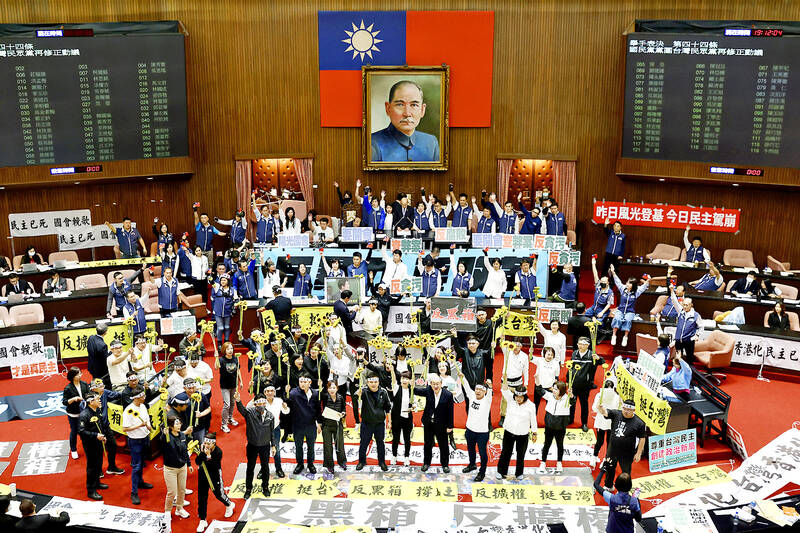Thousands of people yesterday gathered outside the Legislative Yuan calling for more transparency regarding legislative reform bills and demanding that proceedings that devolved into brawls on Friday last week be declared null and void.
The demonstrators included members of civic groups and political parties such as the Taiwan Statebuilding Party, the New Power Party and the Green Party Taiwan. They decried what they called procedural issues concerning bills proposed by the Chinese Nationalist Party (KMT) and the Taiwan People’s Party (TPP), adding that the bills should undergo committee reviews in line with standard legislative procedure.
The protesters said the opposition parties were resorting to undemocratic behavior to push through bills that would introduce “contempt of legislature” charges, require the president to answer lawmakers’ questions and expand the legislature’s investigative powers.

Photo: Lo Pei-de, Taipei Times
The bills should be sent back to the legislature’s Judiciary and Organic Laws and Statutes Committee for a substantive review, while last week’s proceedings should be declared invalid, they said.
The bills did not undergo a line-by-line review in the committee. Instead all versions proposed by KMT legislators and the TPP caucus were sent directly to the legislative floor, where on Friday last week, the two parties presented a series of revisions that were not available for review on the legislature’s Web site.
Democratic Progressive Party (DPP) legislators said the process lacked transparency, while the opposition said that printouts of the revisions were placed on their desks at the time of the proceedings.

Photo: Ritchie B. Tongo, EPA-EFE
Meanwhile, in the legislative chamber yesterday, opposition lawmakers used their majority to pass a second reading of parts of the reform bills that would allow legislators to fine government officials up to NT$200,000 for “contempt of the legislature” for contraventions during interpellation sessions.
The KMT holds 52 seats in the 113-seat legislature, the TPP has eight and the DPP has 51, while two independent legislators are ideologically aligned with the KMT.
The draft amendments to Article 25 of the Act Governing the Legislative Yuan’s Power (立法院職權行使法) added the clause that officials cannot respond to legislators’ queries with a question.
The draft says the person being questioned must not refuse to answer, refuse to provide or hide information, or answer falsely, or commit other acts that could be considered “contempt of the legislature,” unless the information pertains to national defense, would cause obvious and immediate damage to diplomatic relations, or should be kept secret under other laws or items that the speaker has agreed to.
The person being questioned cannot recuse themselves from the interpellation unless the legislator or legislative committee agrees to their request, it says.
The third paragraph of the article was amended to state that if the person being questioned contravenes any of the requirements, they should be stopped, ordered to appear or ordered to answer to the legislative speaker. The speaker or legislator asking the questions can make a motion — which must receive the signatures or approval of five other legislators in the session — to have the person fined NT$20,000 to NT$200,000 for failing to comply. Fines can be applied for each offense.
Government officials who make false statements should be criminally indicted, it says.
The DPP caucus said that Legislative Speaker Han Kuo-yu (韓國瑜) did not check the number of legislators present each time before a vote was taken.
DPP legislators wore headbands reading: “Democracy is dead,” while DPP caucus whip Ker Chien-ming (柯建銘) said that the KMT and TPP legislators were “sellouts and traitors to Taiwan.”
Responding to criticisms that he broke protocol by not allowing the legislature to review the amendments item by item, Han said he had suggested such a review during cross-caucus negotiations last week, adding that each party caucus has one representative who can ask questions, but the DPP caucus refused.
Commenting on the protesters outside the legislature, TPP caucus whip Huang Kuo-chang (黃國昌) said that Taiwan is a free and democratic society, and he respects everyone who has different opinions.
However, he said that all discussions should be based on fact, urging the DPP to stop spreading false information.
Additional reporting by Lee Wen-hsin

EUROPEAN TARGETS: The planned Munich center would support TSMC’s European customers to design high-performance, energy-efficient chips, an executive said Taiwan Semiconductor Manufacturing Co (TSMC, 台積電), the world’s largest contract chipmaker, yesterday said that it plans to launch a new research-and-development (R&D) center in Munich, Germany, next quarter to assist customers with chip design. TSMC Europe president Paul de Bot made the announcement during a technology symposium in Amsterdam on Tuesday, the chipmaker said. The new Munich center would be the firm’s first chip designing center in Europe, it said. The chipmaker has set up a major R&D center at its base of operations in Hsinchu and plans to create a new one in the US to provide services for major US customers,

The Ministry of Transportation and Communications yesterday said that it would redesign the written portion of the driver’s license exam to make it more rigorous. “We hope that the exam can assess drivers’ understanding of traffic rules, particularly those who take the driver’s license test for the first time. In the past, drivers only needed to cram a book of test questions to pass the written exam,” Minister of Transportation and Communications Chen Shih-kai (陳世凱) told a news conference at the Taoyuan Motor Vehicle Office. “In the future, they would not be able to pass the test unless they study traffic regulations

‘A SURVIVAL QUESTION’: US officials have been urging the opposition KMT and TPP not to block defense spending, especially the special defense budget, an official said The US plans to ramp up weapons sales to Taiwan to a level exceeding US President Donald Trump’s first term as part of an effort to deter China as it intensifies military pressure on the nation, two US officials said on condition of anonymity. If US arms sales do accelerate, it could ease worries about the extent of Trump’s commitment to Taiwan. It would also add new friction to the tense US-China relationship. The officials said they expect US approvals for weapons sales to Taiwan over the next four years to surpass those in Trump’s first term, with one of them saying

BEIJING’S ‘PAWN’: ‘We, as Chinese, should never forget our roots, history, culture,’ Want Want Holdings general manager Tsai Wang-ting said at a summit in China The Mainland Affairs Council (MAC) yesterday condemned Want Want China Times Media Group (旺旺中時媒體集團) for making comments at the Cross-Strait Chinese Culture Summit that it said have damaged Taiwan’s sovereignty, adding that it would investigate if the group had colluded with China in the matter and contravened cross-strait regulations. The council issued a statement after Want Want Holdings (旺旺集團有限公司) general manager Tsai Wang-ting (蔡旺庭), the third son of the group’s founder, Tsai Eng-meng (蔡衍明), said at the summit last week that the group originated in “Chinese Taiwan,” and has developed and prospered in “the motherland.” “We, as Chinese, should never